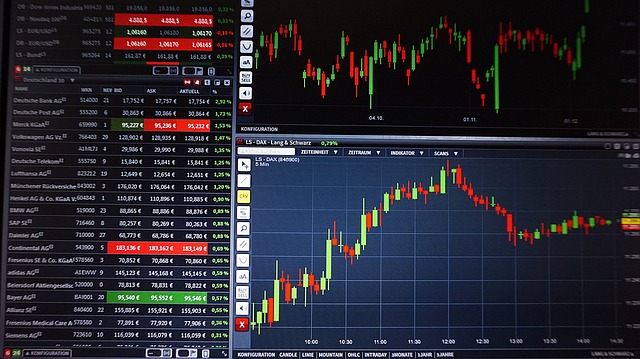Trading Crypto Futures in the US: A Guide
Author: Jameson Richman Expert
Published On: 2025-01-30
Prepared by Jameson Richman and our team of experts with over a decade of experience in cryptocurrency and digital asset analysis. Learn more about us.
The rise of cryptocurrency has revolutionized the financial landscape, providing new investment opportunities for both individuals and institutions. Among the various trading options, crypto futures have gained immense popularity. But what exactly are crypto futures, and how can you trade them in the United States? This comprehensive guide will delve into the essentials of crypto futures trading, including the benefits, risks, and regulatory aspects you need to know.

Understanding Crypto Futures
Crypto futures are derivatives that allow traders to speculate on the future price of a cryptocurrency without actually owning the underlying asset. Traders enter a contract to buy or sell a specific amount of a cryptocurrency at a predetermined price on a future date. This trading approach provides opportunities to profit irrespective of the market's direction, whether it's going up or down.
For example, if you believe Bitcoin's price will rise in the upcoming month, you can buy a Bitcoin futures contract. Conversely, if you think it will fall, you can sell a futures contract. This flexibility attracts various traders, including experienced investors and newcomers seeking to diversify their portfolios.
The Benefits of Trading Crypto Futures
There are several advantages to trading crypto futures. Let's take a closer look:
1. Leverage
One of the most significant benefits of trading futures is leverage. Exchanges allow traders to control a more substantial position with a smaller amount of capital. For instance, you may need only 10% of the contract's value as margin. However, while leverage can amplify your profits, it can also increase your losses, so it's essential to use it cautiously.
2. Hedging Opportunities
Futures contracts serve as an excellent hedging tool. If you own cryptocurrency, you can sell futures contracts to protect yourself against potential price declines. This way, you lock in a selling price, minimizing losses during market downturns.
3. Access to Institutional Investors
The introduction of regulated crypto futures has led to increased participation from institutional investors. These entities often prefer trading futures, as they provide a more structured environment and standardized contracts. Their involvement can help bring more liquidity to the market, benefiting all traders.
How to Trade Crypto Futures in the US
Trading crypto futures in the United States is relatively straightforward, but there are specific steps to follow:
1. Choose a Regulated Exchange
To trade crypto futures legally, you need to choose a regulated exchange. Popular options include:
- Binance Futures
- Coinbase Pro
- CME Group
Make sure to select an exchange that complies with local regulations and offers a user-friendly interface. If you’re interested in getting started, consider registering on Binance, one of the largest cryptocurrency exchanges in the world.
2. Create an Account
After selecting an exchange, you'll need to create an account. This process typically involves providing your email address, creating a password, verifying your identity, and completing the necessary KYC (Know Your Customer) requirements.
3. Fund Your Account
Once your account is set up, the next step is to deposit funds. You can fund your account using various payment methods, including bank transfers, credit cards, and even other cryptocurrencies. Keep in mind that each exchange may have different funding options, so be sure to check what’s available.
4. Navigate the Trading Platform
Familiarize yourself with the trading interface. Understand how to view price charts, place orders, and analyze market data. Most exchanges provide tutorials and demos to help you navigate their platforms more effectively.
5. Start Trading
Now that you’re all set, you can start trading crypto futures. Keep in mind that it's important to have a trading strategy in place to manage risks effectively. Consider factors like market trends, volatility, and your risk tolerance before placing any trades.

Risks Involved in Trading Crypto Futures
While trading crypto futures offers exciting opportunities, it is not without its risks. Here are some factors to consider:
1. Market Volatility
The cryptocurrency market is known for its extreme volatility. Prices can fluctuate dramatically within short periods, leading to potential losses if traders fail to react quickly. Successful futures trading requires a keen understanding of market dynamics and timely decision-making.
2. Regulatory Risks
The regulatory landscape for cryptocurrencies is continually evolving. Changes in legislation can impact how futures are traded and even which exchanges remain operational. It's vital to stay updated on regulatory news concerning crypto futures trading in the US.
3. Leverage Risks
While leverage can amplify profits, it can just as easily increase losses. If the market moves against your position, you may lose more than your initial investment. It’s crucial to use leverage responsibly and apply risk management strategies, such as stop-loss orders.
Tax Implications of Trading Crypto Futures
In the US, the IRS treats cryptocurrencies as property for tax purposes, which also extends to futures trading. Here's what you need to know:
1. Reporting Requirements
When you buy or sell crypto futures, you must report the capital gains or losses on your tax return. Any profits realized from trading contracts are subject to taxation, so keeping detailed records of your trades is essential.
2. Holding Period
The holding period for crypto futures can also affect your tax rate. If you hold a position for more than a year, it might qualify for long-term capital gains tax rates, which are typically lower than short-term rates. Consult a tax professional for personalized advice.
Conclusion
Trading crypto futures in the US can be a lucrative endeavor if done responsibly. By understanding the fundamentals, advantages, and risks of futures trading, you can make informed decisions to enhance your trading experience. Remember to choose a reputable exchange like Binance, conduct thorough research, and stay updated on regulatory changes.
Always consider consulting with financial advisors to tailor your trading strategies to your financial goals. Embrace the opportunities that crypto futures offer, but approach the market with caution and awareness of the inherent risks.